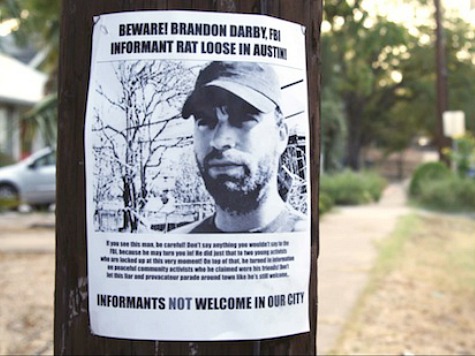
Documentary filmmaker Jamie Meltzer is no fan of the Michael Moore School of Storytelling.
Meltzer, who teaches documentary filmmaking at Stanford University, has little patience for films which tell the viewer what to think or preach to the proverbial choir.
“They’re close to propaganda,” Meltzer tells Big Hollywood. “You go in and it reaffirms your thoughts as an audience member. It doesn’t allow you to think for yourself.”
His latest project, Informant, began with him not knowing what to make of Brandon Darby, the former radical who became an FBI informant to stop a terrorist attack at the 2008 Republican National Convention.
Meltzer first came to learn Darby’s story through the open letter the activist wrote to his former colleagues describing his shift from radical to informant. The letter featured Darby’s e-mail address, so Meltzer wrote him and began the dialogue that sparked his newest film.
“He was open to discussing things … and was thoughtful,” Meltzer says. The director still had plenty of questions about Darby’s journey, and he finally figured it was worth several years of his life to get some answers via the documentary film format.
Just don’t expect to see said answers on screen.
“It really comes down to perspectives, political perspectives, ideological perspectives,” he says. “People will see [Darby’s story] in two different ways.”
The 2011 film Better This World also explored Darby’s transformation, but you won’t see Darby being interviewed by the filmmakers or otherwise help shape the narrative.
For Informant, Meltzer got Darby to share his story, participate in critical re-enactments and essentially describe his transformation in a nuanced fashion. The film, now in theaters as well as via Cable VOD, Xbox, Playstation, iTunes, Amazon, Vudu, Google Play and YouTube, opens with Darby discussing the death threats against him. It’s a far more empathetic way to meet him than World affords in its biased narrative.
While Darby is allowed to speak in his defense, the film does offer an array of figures who question Darby’s point of view. Meltzer defends the tactic, saying Darby is given so much screen time it would throw the film off balance to add more voices in the subject’s favor.
Meltzer understands the more popular documentaries of late fall into the Moore camp, films that brim with an overt agenda. He wanted something else, even though he knew it would invite tension with the people featured in his work.
He says Darby initially hated Informant, and Meltzer wasn’t surprised by the reaction.
“I knew early on … I’d have to cover the controversy and have opinions he wouldn’t agree with,” he says. Slowly, he started to respect it a little bit more … it’s not surprising his relationship to the film is complicated.”
Documentary filmmakers can’t help but get close to their subjects. Sometimes, that invites emotions that can’t be brought into the editing bay, Meltzer says.
“At some point I realized, to make the film wanted to make … no one in it would be 100 percent happy with it,” he says. “Everyone would have a beef with it.”

COMMENTS
Please let us know if you're having issues with commenting.